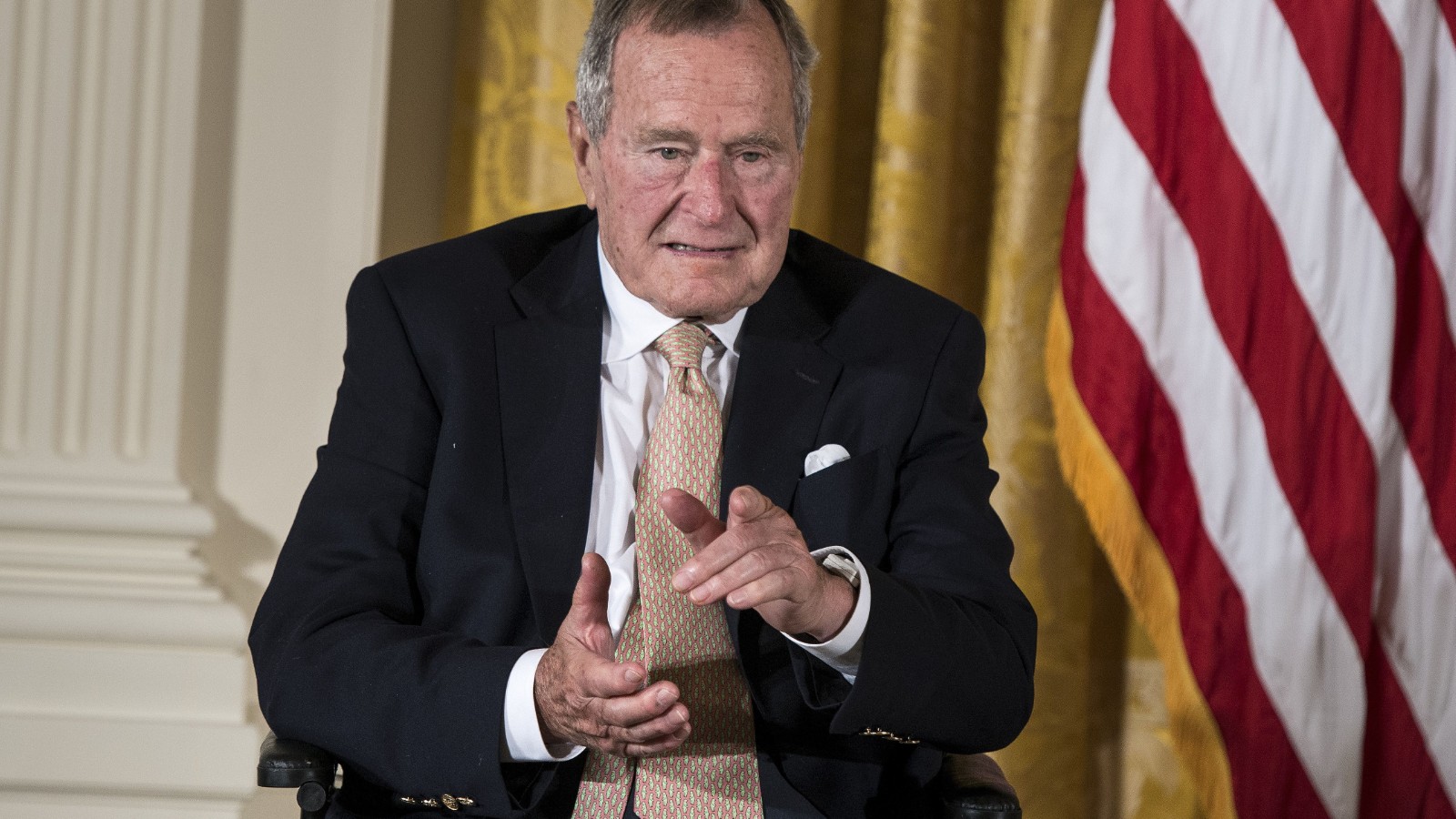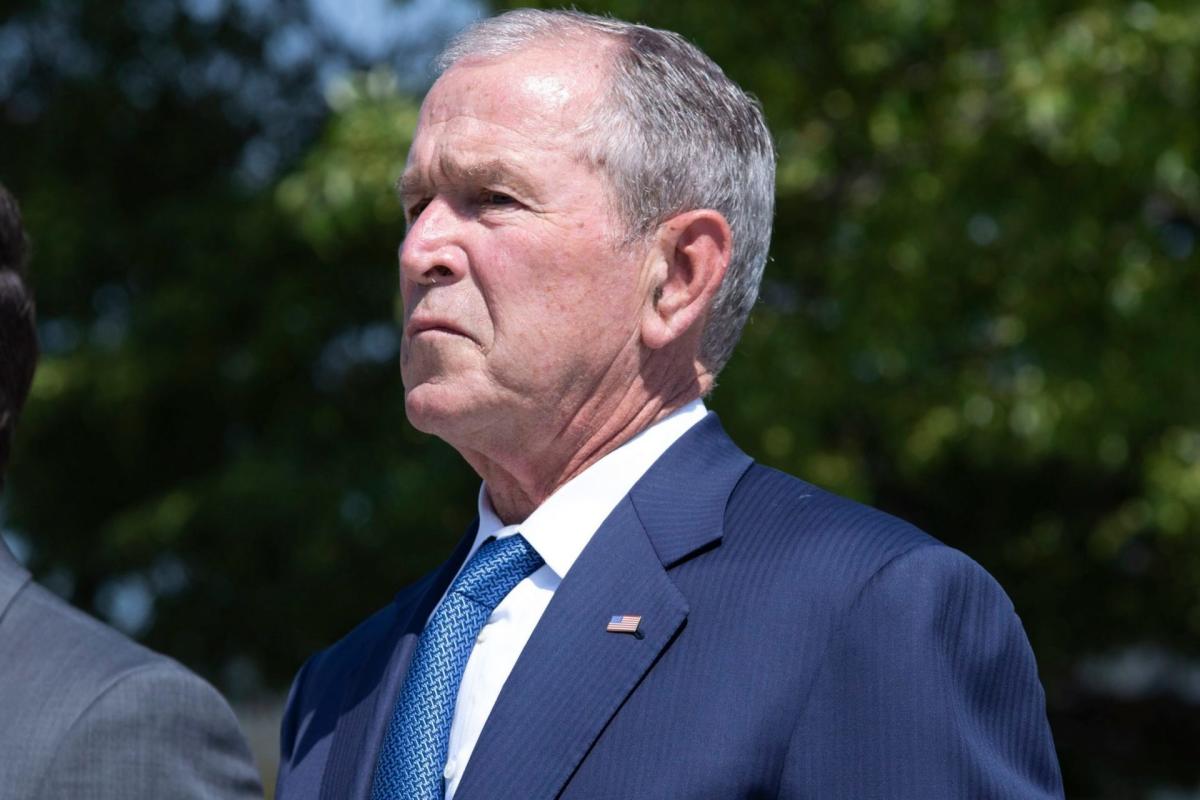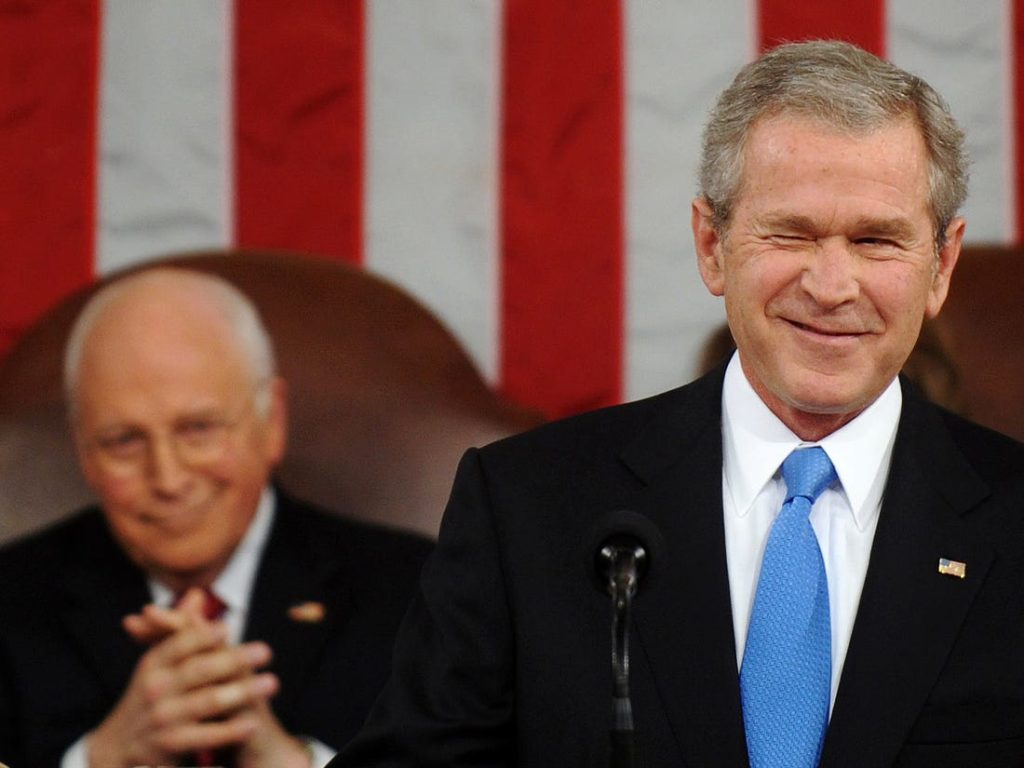Have you ever wondered about the financial standing of former world leaders, especially after their time in office? It's a question that, you know, pops up quite often for many people. When someone serves as the President of the United States, their life changes in many ways, and that includes their financial situation. We often think about the power and influence, but the money aspect is also a big part of the picture for public figures.
For someone like George W. Bush, who held one of the most significant positions on the planet, understanding his financial journey after leaving the White House is, like, a really interesting topic. People are curious about how former presidents support themselves, what their income streams look like, and if they accumulate, you know, a very large amount of money after their public service ends. It's about seeing the extent of their financial success.
This article will take a close look at the question of "how much is George W. Bush worth." We will explore the various ways former presidents, including him, build their financial portfolios once their official duties are complete. It's a way to get a better grasp on the financial aspects of a post-presidency life, which, you know, can involve a substantial degree of earnings.
Table of Contents
- George W. Bush: A Brief Biography
- Personal Details and Bio Data
- The Financial Landscape for Former Presidents
- George W. Bush's Primary Sources of Wealth
- Exploring the Concept of Worth
- Frequently Asked Questions About Former Presidential Finances
- What Does It Mean to Have "Much" Wealth?
- The Ongoing Interest in How Much is George W. Bush Worth
George W. Bush: A Brief Biography
George Walker Bush, you know, served as the 43rd President of the United States from 2001 to 2009. Before his time in the Oval Office, he was the 46th Governor of Texas, holding that position from 1995 to 2000. His political career, you see, followed a path that included business ventures and a background in the oil industry.
He was born in New Haven, Connecticut, and grew up in Midland and Houston, Texas. His family has a long history in American politics, with his father, George H.W. Bush, also serving as president. This background, in a way, shaped much of his early life and career choices, leading him towards public service after his business pursuits.
During his presidency, he faced some really big challenges, including the September 11th terrorist attacks and the subsequent wars in Afghanistan and Iraq. His administration also saw the creation of the Department of Homeland Security and the No Child Left Behind Act, which, you know, aimed to reform education. After leaving office, he has, like, remained active in public life through his presidential center and various charitable activities, keeping a presence in the national conversation.
Personal Details and Bio Data
| Full Name | George Walker Bush |
| Date of Birth | July 6, 1946 |
| Place of Birth | New Haven, Connecticut, U.S. |
| Spouse | Laura Welch Bush |
| Children | Barbara Pierce Bush, Jenna Bush Hager |
| Education | Yale University (B.A.), Harvard Business School (M.B.A.) |
| Political Party | Republican |
| Presidency Term | January 20, 2001 – January 20, 2009 |
The Financial Landscape for Former Presidents
When a president finishes their term, their financial situation changes pretty dramatically. They no longer receive a presidential salary, which is, you know, a fixed amount during their time in office. Instead, they transition into a different kind of financial life, one that often involves leveraging their unique experience and public profile. It's a shift that, in some respects, opens up new avenues for earning money.
The perks and benefits that come with being a former president are, like, quite substantial, too. They receive a pension, security protection, office space, and funds for staff, all paid for by the taxpayer. These benefits, you see, help them maintain a certain standard of living and continue their public work without having to worry about basic expenses. This support, in a way, provides a very solid foundation for their post-presidency financial activities.
The ability of former presidents to earn money after leaving office is, well, quite significant. Their status as a former leader gives them a unique platform, which can be monetized through various means. This is where we start to see how "much" wealth can be accumulated, as their influence and public recognition translate into considerable financial opportunities. It's a situation that, apparently, allows for a great quantity of earnings.
George W. Bush's Primary Sources of Wealth
So, when we think about how much is George W. Bush worth, we need to look at the different ways he has generated income since 2009. Like many former presidents, his wealth comes from a mix of traditional and unique sources. These income streams, you know, really add up over time, building a substantial financial picture.
It's not just one big paycheck, but rather a combination of ongoing activities that contribute to his overall financial standing. This approach, in a way, allows for a steady accumulation of assets and funds. We can see, for example, how a large amount of money can be earned through these varied endeavors.
Book Deals and Memoirs
One of the most common and lucrative ways for former presidents to earn money is through book deals. George W. Bush is no exception here. His memoir, "Decision Points," published in 2010, was a massive bestseller. It sold, you know, over two million copies in its first few weeks alone, which is a really big number for a book.
The advances for such high-profile books can be, like, in the millions of dollars. For "Decision Points," it was reported to be around $7 million, which is, you know, a very considerable sum. These books offer a chance for former leaders to share their side of history, providing insights into their time in office and their personal reflections. This particular source of income, in a way, brings in a great quantity of money.
He also published "41: A Portrait of My Father" in 2014, another successful book that paid tribute to his dad. These literary works not only add to his financial worth but also, you know, shape his legacy. It's clear that writing has been a very important part of his post-presidency financial plan, contributing a substantial amount to his overall worth.
Speaking Engagements
Public speaking is, arguably, the biggest money-maker for most former presidents. Their unique perspective and experiences are, like, in high demand for corporate events, conferences, and private gatherings. George W. Bush, too, has commanded impressive fees for his speeches.
Reports suggest that he can earn anywhere from $100,000 to $175,000, or even more, for a single speaking engagement. Considering the number of speeches a former president might give in a year, this can quickly add up to millions of dollars annually. It's a way for him to share his thoughts on leadership, world events, and his personal journey. This stream of income, you know, contributes a very large amount to his overall financial picture.
These speaking fees are a testament to the continued interest in his views and experiences. He travels around the world, addressing various audiences, and these appearances are, you know, a major part of his financial portfolio. It's a consistent source of earnings that, in some respects, provides a significant degree of financial stability.
Presidential Pension and Benefits
Under the Former Presidents Act, all former U.S. presidents receive a pension and other benefits for life. This act was passed, you know, to maintain the dignity of the office and to help former presidents manage their post-White House lives. It's a form of support that, apparently, ensures they are well cared for.
As of 2024, the annual pension for former presidents is about $226,000. This amount, you know, is adjusted periodically, so it can change over time. In addition to the pension, they receive funds for office space, staff salaries, travel expenses, and Secret Service protection. This protection, you see, is for life, which is a very important benefit.
While the pension itself isn't the largest component of a former president's wealth, it provides a stable and guaranteed income. It's a baseline, you know, that allows them to pursue other ventures without financial pressure. This support, in a way, is a crucial part of their financial security, ensuring they have a consistent amount of income.
Investments and Other Holdings
Like many people with substantial earnings, George W. Bush has, like, also invested his money over the years. While the specifics of his investment portfolio are private, it's safe to assume he has holdings in various assets. These could include stocks, bonds, and other financial instruments. These investments, you know, typically grow over time, adding to his overall worth.
He also has real estate. For instance, he owns a ranch in Crawford, Texas, which served as his "Western White House" during his presidency. Property values, you see, can appreciate, contributing to one's net worth. These assets, in some respects, represent a significant portion of his wealth beyond just liquid cash.
The combination of these investments and physical assets, you know, really rounds out his financial picture. They are part of the overall "much" in terms of his financial quantity. It's a way for him to grow his wealth beyond just direct earnings from books or speeches, ensuring a more diverse financial foundation.
Exploring the Concept of Worth
When we ask "how much is George W. Bush worth," we're often thinking strictly about money. However, worth, you know, can mean more than just financial assets. For a former president, their influence, their legacy, and their ability to bring people together also represent a kind of worth. This is a very important aspect to consider.
His post-presidency work, including his focus on painting and his efforts through the George W. Bush Presidential Center, contributes to a different kind of value. The Center, for example, promotes education, policy, and service, which, you know, has a far-reaching impact. These activities, in a way, build a legacy that goes beyond dollar figures.
So, while we can estimate his financial net worth, it's also, like, important to remember the broader impact he continues to have. This non-monetary "worth" is, you know, a significant part of his public persona and his continued relevance. It's about the great extent of his influence and the degree to which he still contributes to public life.
Frequently Asked Questions About Former Presidential Finances
How do former presidents make money after leaving office?
Former presidents primarily earn money through lucrative book deals, high-paying speaking engagements, and consulting roles. They also receive a lifetime pension and benefits from the government, which, you know, provides a stable financial base. Their unique status allows them to command very high fees for their public appearances and written works, contributing a great quantity to their overall financial standing.
What is the typical pension for a former U.S. President?
The typical pension for a former U.S. President is, you know, about $226,000 annually, as of recent figures. This amount is adjusted periodically based on cost of living. In addition to the pension, they receive funds for office space, staff, and lifetime Secret Service protection, which, you know, is a really big benefit. This pension, in some respects, ensures a basic level of financial security.
What are George W. Bush's main sources of income now?
George W. Bush's main sources of income now are, like, primarily from his successful book sales, such as "Decision Points" and "41: A Portrait of My Father." He also earns a substantial amount from private speaking engagements. Furthermore, he receives his presidential pension and benefits, which, you know, provide a consistent income. These combined activities, apparently, contribute a very large amount to his current worth.
What Does It Mean to Have "Much" Wealth?
The word "much" when we talk about wealth really points to a large quantity or a substantial amount. When someone asks "how much is George W. Bush worth," they are curious about the great degree of his financial holdings. It implies that his wealth is, you know, significant and notable, not just a small sum. This is about understanding the extent of his financial success.
It's about having a far larger amount of something than just, say, enough to get by. "Much" suggests an abundance, a financial standing that is well beyond ordinary. For instance, if you don't get much sleep, you don't get a lot; similarly, if someone has much wealth, they have a lot of it. This concept, in a way, helps us frame the scale of a former president's financial achievements after leaving office.
So, when we discuss "how much is George W. Bush worth," we are, in fact, exploring the substantial extent of his financial resources. It indicates a significant level of money and assets, implying a notable difference compared to what most people might consider usual or ordinary. It's a way to convey the considerable quantity of his accumulated wealth, which, you know, comes from various sources.
The Ongoing Interest in How Much is George W. Bush Worth
The curiosity about "how much is George W. Bush worth" remains high, even years after he left office in January 2009. This ongoing interest, you know, reflects a broader fascination with the financial lives of public figures, especially those who have held such powerful positions. People are, like, always wondering about the financial aspects of leadership.
It's not just about a simple number; it's about understanding the mechanisms through which former presidents build their wealth. The transparency, or lack thereof, in these figures also adds to the intrigue. We can see, for example, that there's a real desire to grasp the full financial picture of someone who has shaped history. To learn more about former presidents' lives on our site, you can explore our various articles.
As of February 2024, the general estimates of George W. Bush's net worth typically place him in the range of tens of millions of dollars. These estimates are based on publicly available information about his book deals, speaking fees, and presidential pension. It's a way to gauge the financial success that comes with, you know, a post-presidency career. For further insights into the finances of public figures, you might find this page interesting: .



Detail Author:
- Name : Susie Christiansen
- Username : koelpin.lance
- Email : gorczany.anabel@yahoo.com
- Birthdate : 1994-04-24
- Address : 7752 Tromp Key Apt. 306 Lake Hiltonview, MO 95297
- Phone : 1-980-768-1388
- Company : Pfeffer-Beahan
- Job : Drycleaning Machine Operator
- Bio : Rem dolor quae magni distinctio et soluta hic. Facilis est exercitationem nihil velit. Et reprehenderit id aut doloremque voluptatem.
Socials
linkedin:
- url : https://linkedin.com/in/javonte927
- username : javonte927
- bio : Ipsa quidem suscipit quis asperiores unde non.
- followers : 6176
- following : 2767
twitter:
- url : https://twitter.com/jgaylord
- username : jgaylord
- bio : Nisi reprehenderit aut eligendi. Enim tempore ex veniam ex eos iste. Quidem nihil ut voluptate. Qui deleniti facere enim sint rerum.
- followers : 3118
- following : 901
instagram:
- url : https://instagram.com/gaylord2008
- username : gaylord2008
- bio : Nihil ut voluptas voluptatem in magnam qui ea sequi. Sint aut suscipit aut tenetur.
- followers : 3005
- following : 1668
tiktok:
- url : https://tiktok.com/@javonte_xx
- username : javonte_xx
- bio : Aut est ut mollitia aut blanditiis officiis cum. Id quo cum nihil quia iure.
- followers : 6913
- following : 530